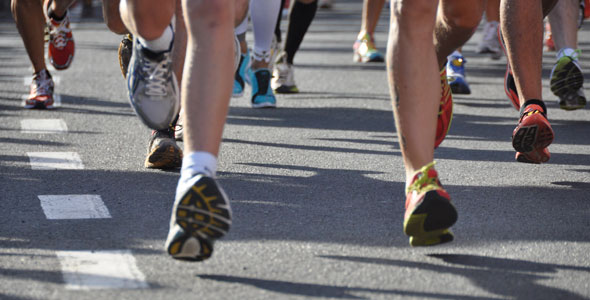![]() This article was provided in response to Bryan J Veal about ‘Bloody urine’ experienced after running.
This article was provided in response to Bryan J Veal about ‘Bloody urine’ experienced after running.
Doctor Andrew Bosch – resident exercise physiologist
Bloody urine: Why?
Long distance runners should always keep a close watch on their urine output since it serves as a good monitoring tool for keeping a check on fluid  balance, especially if training regularly in hot weather. Such observation will have revealed to the avid urine-watching runner just how long it can sometimes take before voiding for the first time after an event such as a marathon. And it will also have been noticed just how concentrated the urine can appear at that first voiding. The concentrated appearance of the urine is a little troubling to some runners. How much more so, then, if at that first voiding after a marathon the runner sees not just concentrated urine, but instead, blood.
balance, especially if training regularly in hot weather. Such observation will have revealed to the avid urine-watching runner just how long it can sometimes take before voiding for the first time after an event such as a marathon. And it will also have been noticed just how concentrated the urine can appear at that first voiding. The concentrated appearance of the urine is a little troubling to some runners. How much more so, then, if at that first voiding after a marathon the runner sees not just concentrated urine, but instead, blood.
For most runners to whom this may happen, it is quite alarming to see what appears to be a substantial amount of blood loss. This is usually followed by panic and frantic telephone calls to whomever the afflicted runner thinks may be able to help in some way. Most times, the family GP is visited the next day and various tests are done to determine the possible cause of appearance of blood in the urine. With great relief the runner then usually learns that all is well and there is no need for any treatment.
Blood in urine, or haematuria, may have a number of causes. The most common reason for haematuria is a result of impact of the walls of the bladder while running. Repeated many times over a prolonged period such as during a marathon, each of these minor impacts causes more severe damage until eventually there is sufficient trauma to cause bleeding. The damage sustained to the bladder walls can be viewed through an instrument called a cystoscope, which is how the nature of the “injury” was first determined and which has also been used to show that healing occurs within a couple of days. Since the damage is due to impact of the bladder walls, the chance of developing haematuria is greatest when running with an empty bladder. Therefore, if you develop haematuria, avoid urinating immediately before the start of a marathon and see if that helps. The presence of some urine in the bladder will help prevent the bladder walls from making contact with each other.
Another cause of haematuria may be altered permeability of the filtering apparatus. Urine is produced by filtration of the blood through a network of blood vessels surrounded by a specialised membrane, called the glomerulus. Normally, blood does not pass the glomerulus apparatus into the urine that is being formed. However, there is evidence that the permeability of the glomerulus is sometimes increased during exercise, allowing red blood cells to collect with the urine. This condition reverses once exercise stops and the problem should not persist.
Red-coloured urine
A third cause of a red-coloured urine is related to haemoglobin. Haemoglobin, which is red in colour, can enter the urine under certain conditions. One such condition may occur when the red blood cells are physically damaged as they pass through the blood capillaries of the foot by impact of the feet with the ground while running. The damage sustained causes the release of the haemoglobin in the cell, which is then excreted in the urine. This phenomenon has been called “footstrike haemolysis”, or more correctly, haemoglobinuria. It does not occur very commonly. In fact, in a study by Steenkamp in 1986, there was no evidence of damage to the red cells after a marathon race. Therefore, it may only occur in susceptible people with red blood cells that are more fragile than average.
Running, however, is not the only cause of haematuria. It can also be caused by something that has nothing to do with running at all. Thus the first time that a runner experiences bloody urine after exercise a consultation with a GP is probably indicated. This is especially so if the condition does not resolve in 24 to 48 hours after exercise, if there is associated low back pain or fever, or if the bloody urine also occurs at rest. If testing reveals no apparent cause, then future episodes can be ignored. Generally, however, a runner need not be too perturbed if they pass a bloody urine after a marathon.



























Sooo… would it be possible that running 5km could cause you to pass urine, if done on an empty bladder?
depends on how hard you ran, so yes, it is possible
On May 30, I passed a small amount of blood in my urine. This lasted for 3 days, each day less blood. The amount is impossible to measure but I assume that it was just a few grams. For the 2 weeks previous to this I was walking 7 to 8 miles per day and did not carry a water bottle. Therefore, I assume that the cause was the empty bladder rubbing on itself which has been cited as a cause per a number of website explanations.
So, here is my question, because I have no blood passing in the last 39 days should I just assume that I have defined the cause or should I have a Urologist examine me for bladder or kidney cancer? BTW, I am 77 years old.
To be on the safe side it would probably be best to go have a check up. Purely to be on the safe side
TheEd
I work out four times a week and am a certified kickboxing instructor. I’ve passed blood in my urine after strenuous workouts. It normally passed with rehydration and drinking lots of cranberry juice. I’ve also visited my MD if the condition persisted and a week’s worth of an antibiotic (e.g. Cipro) and everything cleared up. Except one day in 2013 it didn’t. I went to my MD who referred me to a urologist. Last summer I had a small tumor removed from my bladder that was Stage 1 cancer. I finished BCG immunotherapy treatments and am now cancer free. A word of advice: if the UT bleeding persists, see a Urologist. Early detection can and will save lives.
Rich, I have had the exact experience you had about a year ago. I am an avid and competitive squash player and started to see urine in blood more frequently, the tougher the matches were. Went to see a urologist, and they also found a small tumor in my bladder, stage 1, removed etc, same story. However, the Dr wasnt convinced that was the cause, but merely a divine intervention to detect the cancer early. For the past 3 weeks i have had 3 episodes of blood in urine again (but have played much more intense games prior that). Luckily I am going for my 3 month checkup again this week……. lets hold thumbs.
Has this occurred again with you?
My normal running distance was 7-8 km, last week I ran 9 km, and day before yesterday 14km in a go with just two water breaks in-between. However before starting run I emptied bladder but refueled with few sips after 4.8km intervals. Day was fine, just yesterday started having chills and body ache, which followed by frequent urge for urination even without having any urine in bladder. It went too painful today, however there was no blood in urine, in fact the colour of urine was more off white than normal.
Went to a internal medicine doctor in evening, he asked for urine test including culture and prescribed a medicine for intermediary relief from the pain while urinating.
I was more or less assuming it to be a viral infection, however after reading this post and several other posts, I am not ruling out any infection caused by long running.
However the colour of urine isn’t red. Could it be possible to have infection in urine because of urine without the blood in it.
Harish, the colour can be from red to dark brown even towards black. If the colour is different to that, make sure to see a doctor. Going to see a sports doctor is the best
Have just suffered my second bout of visible blood in urine after running. After the first bout had scans, ultrasound, cytology and a camera in the bladder and nothing found. (This happened 10 months ago)
In between I trained and ran a marathon and no visible blood in urine.
After a recent run I appeared to pass blood, went to doctors the following day and no blood evident in urine with a dip stick test. Ran the following day and no blood. Ran again the day after and blood/red is back. Spoke to Doctor and my urologist and we appear to be going to go through with the same set of tests again. Only new test seems is to be a urinary myoglobin test ( if/when a pass blood again) . My question is there any other tests we should be undertaking and if you do have fragile blood cells what can you do?
we will speak to Andrew Bosch and await a reply from him, unless you have in the meantime found a solution?
today i ran for abot 6 km out of which 3 km were a steep slope….. when i was bathing i passed reddish coloured urine…. this only happened for the first time though the colour was not purely red it was also some brownish….. so should i be worried or is this normal..????? what are the ways of preventing it from happening again… please suggest….. i’ll be highly obliged…..
Look at the comment from Kris, where better hydration is recommended. Try restrict your running to the flat until you have developed a bit more, before running steep slopes. Exertion (too hard) has an impact, as you gain more fitness your body is able to cope with the stresses a lot better. Onwards TheEd
I am a 40yr old Male. This is my third episode of Urine in blood. First time I passed blood was over 10 yrs back after I removed snow for an hour. 2nd time it occurred for no apparent reason couple of years back. I got all the tests, ultrasound etc done with no results. I have been exercising (mostly walking and slow jogging) quite a bit in last 6 months. This week I increased it to interval training. Lot more vigorous than my body is used to. I emptied my bladder prior to running and then ran for 30 mins immediately after the run I had urge to go bathroom where I passed blood red urine. Spoke to my GP and he indicated to keep myself hydrated.
Found this article very helpful to reduce my anxiety. I realize i need to take it easy little bit and keep hydrated. Any advise on other precautions I need to take? Not sure when I can resume my exercise schedule again.
You are normally able to resume training without too much ill-effect, though it can change from person to person and how it impacts on them. Dehydration can lead to sore muscles and other aches, so you can see what suits you before resuming your training. When it comes to interval training, and especially if you new to it, consider running a little easier to start and finish off stronger. So an easier pace and then speed up, without over-taxing yourself. Hope this helps, TheEd
I recently finished a hard 5k on a very steep and hilly course. As I was warming up for it I felt weak and was trembling, but ran anyways and could barely jog. I ran much slower than my last 5k, and when I got home I urinated dark brown/red urine. After rehydrating, it stopped, but the next day I ran a 6 mile easy run, and stopped during the middle of it and urinated dark red urine or just straight blood. It hasn’t happened since, so it has only happened after running. Should I be concerned? Will I be able to run now if I have hydrated and had proper nutrition?
Hi Phil, this does happen when exerting yourself too much and should return to normal after a few days. If it continues, then seeing a doctor would be recommended
I have had 2 episodes of passing red urine after running but once I rehydrated the urine returned to normal clear colour I’m currently training for my first half marathon and have been doing longer runs and more often is it simply a hydration issue as feel I didn’t take enough fluids in before the run. What amount of fluids is the normal when training for half marathon.
when coaching and it is possible to provide drinks, we work on water every 10 to 15 minutes (in warm conditions). The idea is to keep the muscles hydrated so as to avoid problems and that the training routine can be maintained.